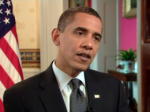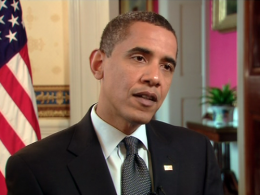
When Barack Obama took office as president of the United States in January 2009, it was widely expected that he would dramatically change, or even reverse, the militarised and unilateral national security policy toward Africa (as well as toward other parts of the world) that had been pursued by the Bush administration.
For many, expectations about the Obama administration’s approach to Africa were raised even higher by the speech that Obama delivered in Ghana in July 2009 and by the tour of Africa that Secretary of State Hillary Clinton made in August 2009. But, after one year in office, it is clear that the Obama administration is essentially following the same policy that has guided US military involvement in Africa for more than a decade.
Thus, in its budget request for the State Department for the 2010 financial year the Obama administration proposed significant increases in US arms sales and military training programmes for African countries, as well as for regional programmes on the continent.
These included the Foreign Military Financing Program (to pay for arms sales to African countries), the International Military Education and Training Program (to train African military officers in the United States), the Trans-Saharan Counter-Terrorism Partnership and the East African Regional Strategic Initiative (to provide training and equipment to the military forces of countries in North Africa, West Africa and East Africa), the International Narcotics Control and Law Enforcement Program (to provide equipment, infrastructure and training to police and other law enforcement units in Africa), military training programmes to help implement peace agreements (in Sudan, Liberia and the Democratic Republic of Congo), the African Contingency Operations and Training Assistance Program (to provide training and equipment to a number of African military forces to enhance their ability to conduct peacekeeping operations and other military activities), and to several anti-terrorism programmes including the Anti-Terrorism Assistance Program, the Terrorist Interdiction Program, the Counterterrorism Financing Program and the Counterterrorism Engagement Program (to provide training and equipment to African countries and build ties with key political leaders on the continent).
And in its budget request for the Defense Department for the 2010 financial year, the Obama administration asked for $278 million to fund the operations of the new Africa Command (AFRICOM) and the Trans-Sahara Counter-Terrorism Partnership programme from the AFRICOM headquarters in Stuttgart, Germany.
In addition, the administration requested $60 million in Defense Department funding in the 2010 financial year to pay for the operations of the Combined Joint Task Force-Horn of Africa (CJTF-HOA), as well as $249 million to pay for the operation of the 500-acre CJTF-HOA base at Camp Lemonier in Djibouti and $41.8 million for major base improvement construction projects at the base.
In addition to the Obama administration’s budget requests, the statement made by Secretary Clinton during her visit to Nigeria in August 2009 provided another indication that the new administration would continue the militarised and unilateral national security policy of its predecessor toward Africa. Following her meeting in Nigeria with Ojo Maduekwe, the foreign minister, and Godwin Abbe, the new minister of defence, Secretary Clinton was asked what the US government intended to do to help the Nigerian government establish stability and security in the Niger Delta.
‘Well, the defense minister was present at the second larger meeting that the foreign minister convened,’ she said, ‘and he had some very specific suggestions as to how the United States could assist the Nigerian Government in their efforts, which we think are very promising, to try to bring peace and stability to the Niger Delta. We will be following up on those. There is nothing that has been decided. But we have a very good working relationship between our two militaries. So I will be talking with my counterpart, the Secretary of Defense, and we will, through our joint efforts, through our bi-national commission mechanism, determine what Nigeria would want from us for help, because we know this is an internal matter, we know this is up to the Nigerian people and their government to resolve, and then look to see how we would offer that assistance.’
Thus, in addition to the security assistance programmes in the budget request for the 2010 financial year, the Obama administration is now considering providing even more military support to the Nigerian government for use in the Niger Delta if the current amnesty programme collapses, as many analysts expect, and the government resumes military operations against insurgent forces in this vital oil-producing region (which produces 10 per cent of America’s total oil imports).
Further indications of the Obama administration’s national security policy toward Africa are provided by its decision to expand US military involvement in Somalia and its decision to continue the Bush administration’s policy of unilateral military attacks against alleged al Qaeda operatives in that country. In June 2009, a senior State Department official (presumed to have been Assistant Secretary of State Johnnie Carson) revealed that the Obama administration had initiated a programme of indirect military support for the Transitional Federal Government (TFG) of Somalia (the internationally recognised government of the country, although it only exercises control over a small part of the capital, Mogadishu, and a few other towns in the southern part of the country).
According to the official, the US government was providing funding to the TFG to finance weapons purchases and had also asked the governments of Uganda and Burundi (which have deployed troops to Mogadishu under an African Union mandate to protect the TFG) to transfer weaponry from their own stockpiles to the armed forces of the TFG in exchange for promises that the US government would reimburse them. In addition, the US government made its base in Djibouti available to other governments for them to provide military training to the armed forces of the TFG.
During her visit to Kenya in August 2009, Secretary of State Hillary Clinton announced that the US government would ‘continue to provide equipment and training to the TFG’, stating ‘very early in the administration, I made the decision, which the President supported, to accelerate and provide aid to the TFG’. She went on to declare that al Shabaab, the Islamist insurgent group fighting to overthrow the TFG, was ‘a terrorist group with links to al-Qaeda and other foreign military networks’ and that they ‘see Somalia as a future haven for global terrorism’. ‘There is no doubt’, Secretary Clinton stated, ‘that al-Shabaab wants to obtain control over Somalia to use it as a base from which to influence and even infiltrate surrounding countries and launch attacks against countries far and near.’ Thus, ‘if al-Shabaab were to obtain a haven in Somalia, which would then attract al-Qaeda and other terrorist actors, it would be a threat to the United States’.
The US government arranged for the delivery of an initial supply of approximately 40 tons of small arms and ammunition worth approximately $10 million to the TFG between May and August of 2009 from the stockpiles of the AU peacekeeping force, along with between $1 million and $2 million in cash to the TFG to finance its own arms purchase, and the delivery of another 40 tons of small arms and ammunition over the following months. A number of other governments – including Kenya, Uganda, Burundi and France – are also reported to have sent military personnel to the US base in Djibouti to provide military training to TFG troops.
According to a report by the Associated Press, American officials ‘say the US military is not conducting the training and will not put any forces in Somalia’. Other countries were conducting the training, the Associated Press reported, because ‘the [Obama] administration is making a concerted effort to avoid putting any American footprint in Somalia, which would risk alienating allies and add to charges by Islamic extremists of a Western takeover.’ However, it has since become clear that most of the arms and training has been transferred to al Shabaab, either by Islamic militants who had infiltrated the TFG military forces or as a result of the sale of the weapons and ammunition on the black market.
Then, in August, US Special Forces troops attacked and killed Saleh Ali Saleh Nabhan, an alleged al Qaeda operative who was accused of being involved in the bombing of the US embassies in Kenya and Tanzania in August 1998, as well as other al Qaeda operations in East Africa. The US Special Forces troops carried out the attack from onboard several helicopters that had been launched from a US Navy warship off the Somali coast, using machine guns and automatic assault rifles to strafe a convoy of four-wheel drive vehicles carrying Nabhan and his retinue. Following the initial assault, the helicopters landed so that their troops could seize Nabhan’s body for positive identification. It is likely that the Obama administration will conduct further military operations in Somalia since, in the words of Vice Admiral Robert Moeller, the deputy commander of AFRICOM, ‘the threat posed by al-Shabaab is something that we pay very, very close attention to’.
And in October 2009, the Obama administration announced a major new security assistance package for Mali that was delivered on 20 October 2009. The package – valued at $4.5 to $5 million (2.3 billion CFA) and which includes 37 Land Cruiser pickup trucks, communication equipment, replacement parts, clothing and other individual equipment – is intended to enhance Mali’s ability to transport and communicate with internal security (counter-insurgency) units throughout the country and control its borders. The security assistance package is officially known as a ‘Counter Terrorism Train and Equip’ (CTTE) programme. Although ostensibly intended to help Mali deal with potential threats from AQIM (al Qaeda in the Islamic Maghreb), it is more likely to be used against Tuareg insurgent forces.
In addition, between April and June of 2009, 300 US Special Forces personnel were deployed to Mali to train Malian military forces at three local bases and, according to Lieutenant Colonel Louis Sombora, deputy commander of Mali’s 33rd Parachute Regiment (which was the recipient of the new US military aid package), more than 95 per cent of his soldiers have received US military training. And in early November 2009, US Air Force Brigadier General Michael W. Callan, vice commander of the US Air Force Africa (the Air Force contingent based in Europe and dedicated to AFRICOM), visited Mali along with other US military personnel in order to inspect local military forces (including the 33rd Parachute Regiment) and tour local military facilities. According to Lieutenant Colonel Marshall Mantiply, defense attaché at the US embassy in Bamako, ‘we are working with the Mali ministry of defense on a ten-year plan’ to enhance the country’s military capabilities.
The aid package to Mali is just the latest instance of America’s growing military involvement in the Sahel region. In his testimony before the Senate Subcommittee on Africa hearing on ‘Counter-terrorism in the Sahel’ on 17 November 2009, Secretary of State for Africa Johnnie Carson identified Mali – along with Algeria, Mali, and Mauritania – as one of the ‘key countries’ in the region for the US counter-terrorism strategy. ‘We believe that our work with Mali to support more professional units capable of improving the security environment in the country will have future benefits if they are sustained’, he stated.
It is clear, therefore, that President Obama has decided to follow the path marked out for Africa by the Clinton and Bush administrations, one based on the use of military force to ensure that America can satisfy its continuing addiction to oil and to deal with the threat posed by al Qaeda and other Islamist extremist groups, rather than chart a new path passed on a partnership with the people of Africa and other countries that have a stake on the continent (including China) to promote sustainable economic development, democracy and human rights in Africa and a global energy order based on the use of clean, safe and renewable resources.
This is the consequence of two factors. To begin with, President Obama genuinely believes in the strategy of the global war on terrorism and thinks that Africa must be a central battlefield in America’s military campaign against al Qaeda and other Islamist extremist groups. Many analysts believe that terrorism does not constitute a significant threat to America’s national security interests and that it would be far more effective to treat terrorism as a crime and to reduce the threat of terrorism by employing traditional law enforcement techniques. But, as demonstrated by the president’s decision to escalate US military operations in Afghanistan, Somalia and Mali, the Obama administration is determined to use military force instead, despite the evidence that – as US military analysts argue – this only helps to strengthen terrorist groups and jeopardises other US security interests.
And with regard to America’s growing dependence on African oil supplies, President Obama understands the danger of relying upon the importation of a vital resource from unstable countries ruled by repressive, undemocratic regimes and the necessity of reducing America’s reliance on the use of oil and other non-renewable sources of energy. But, for understandable reasons, he has concluded that there is simply very little that he can do to achieve this goal during the limited time that he will be in office. He knows that it will take at least several decades to make the radical changes that will be necessary to develop alternative sources of energy, particularly to fuel cars and other means of transportation (if this is even technically feasible).
About Daniel Volman
Daniel Volman is the director of the African Security Research Project in Washington DC. He is a specialist on US military policy in Africa and African security issues and has been conducting research and writing on these issues for more than 30 years.
- Web |
- More Posts(1)







